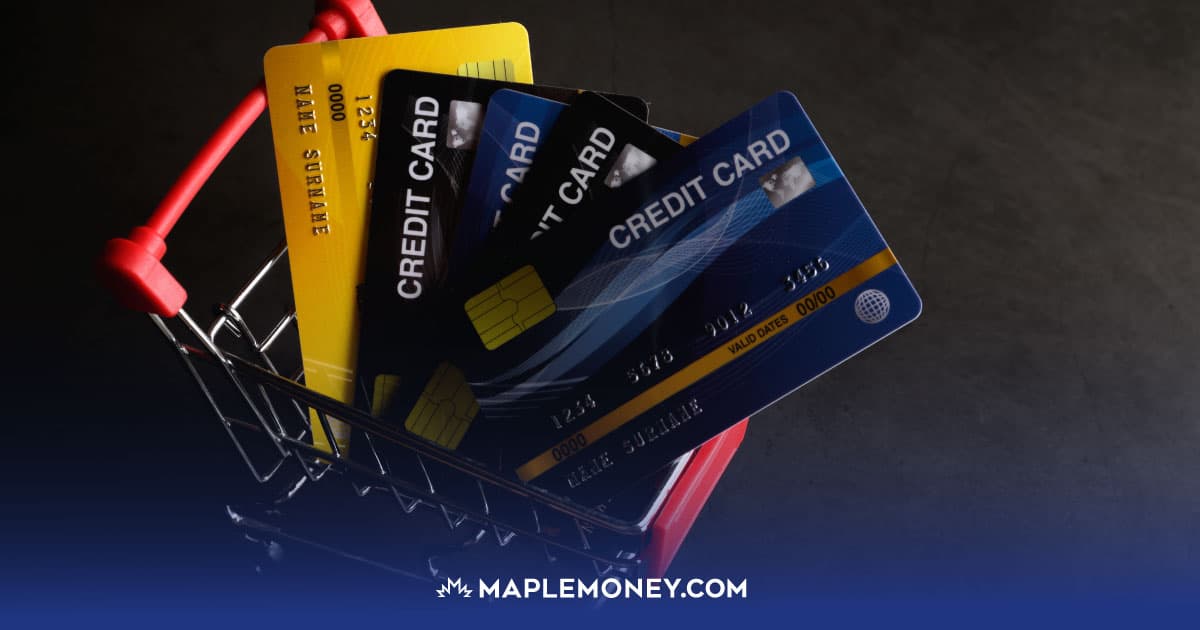How to Pay Off Credit Card Debt Fast: 13 Proven Tips

With the cost of living reaching record highs, managing credit card debt has become increasingly difficult for Canadians. Simply making minimum payments is not enough; you need to take proactive steps to avoid credit card balances from becoming unmanageable.
But with rising mortgage payments and soaring prices at gas pumps and grocery stores, finding the money to pay down credit cards is easier said than done. Thankfully, there are ways you can free up cash flow to pay off your debt.
13 Ways To Pay Off Your Credit Card Fast
I’ve compiled the following list of proven tips, along with valuable insights you can use to help you pay off your credit card debt more quickly and take back control of your finances. While I’ve numbered the items on the list, they aren’t in any particular order.
1. Cut Your Spending
One of the reasons people fall into credit card debt is because they’re living paycheque to paycheque. If you are in that situation, look for ways to cut your expenses. You can use the extra cash flow to pay off your credit card debt more quickly. You can also use the additional funds to start building an emergency fund, so you can avoid relying on your credit card for unexpected expenses in the future.
If you’re unsure where you can cut, look at your bank account or credit card statement going back three months. You might be surprised at how much you spend on discretionary items, such as restaurant meals, clothing, and entertainment.
2. Increase Your Income with a Side Hustle.
The problem with cutting expenses is that you can only go so far. Eventually, you need to increase your income to improve your cash flow. The good news is that making extra money has never been easier.
There are dozens of side hustle ideas you can try that can bring in a couple hundred or a couple of thousand dollars each month. You can use that extra money to pay off your credit card debt more quickly. Find a side hustle that combines your interests and experience with earning potential. The possibilities are endless.
3. Create a Budget
Making a budget sounds downright scary to some people. But a budget is nothing more than a plan for your money that helps you visualize your income, expenses, and financial goals. In other words, you’re taking control of your finances.
You can use several different budgeting methods, but one of the most popular is the zero-based budget, which works by assigning every dollar a job. This includes allocating funds towards paying off your credit cards. More control over your finances can help you achieve your debt repayment goals.
4. Make Paying Off Debt a Priority
If paying off your credit cards isn’t a priority, you may never pay them down. List your financial goals, including retirement savings, travel, or other major purchases. Where does paying off your credit card debt fall on your list of priorities? Consider deferring other major purchases until after you pay off your debt. I’m not saying you can’t travel, but you may decide to take fewer vacations or travel on a budget. Until your debt becomes a priority, you’ll struggle to make a dent in your balance owed.
5. Pay More Than the Minimum Payment
The Financial Consumer Agency of Canada requires credit card companies to provide cardholders with an estimate of the length of time it would take to pay off the balance in full if they only paid the required minimum payment each month. They must report these details on your monthly credit card statement.
If you currently have a balance owing on your credit card, take a look at your statement. You may be shocked by the length of time it would take to pay off the balance by applying just the minimum payment.
Try to make additional payments towards your principal balance whenever possible. This will help reduce your overall credit card debt, and you will pay less interest over time.
6. Make a Lump Sum Payment From Your Savings
If you have money sitting in savings, consider using it to pay off your high-interest credit card debt. While annual savings interest rates have increased significantly over the past year, they still pale compared to credit card interest rates, often 20% or more.
7. Obtain a Consolidation Loan
If you’re not in a position to pay off your credit card balances in the near future, consider applying for a debt consolidation loan through your bank or credit union. Debt consolidation loans allow you to combine high-interest debts into a single loan with a lower interest rate and monthly payments, making it easier to pay off your debt.
8. Take Advantage of Balance Transfer Offers
If you have a good credit score, you may receive offers from credit card companies to move your high-interest credit card balance to a balance transfer credit card with a lower or zero interest rate. Remember that there’s often a balance transfer fee, and the promotional period is limited. By taking advantage of balance transfer credit cards, you can lower your interest charges significantly. Pay off your transferred balance before the promotional rate expires to avoid a return to high-interest charges.
9. Ask for a Lower Rate
Contact your credit card company and ask for a lower interest rate. Explain your financial situation and your intention to pay off your debt. While there are no guarantees your request will be approved, if you’ve been a good customer, they might be willing to reduce your interest rate.
10. Switch to a Lower Interest Credit Card
Some credit card companies offer cards with lower interest rates. While these cards usually have an annual fee, moving from a higher interest rate card can help you save on interest charges, allowing you to pay off your debt faster – review card options to find one that best suits your needs.
11. Use a Debt Avalanche Strategy
You can employ one of two popular debt payoff strategies: The debt avalanche and the debt snowball. The debt avalanche method involves paying off debts with the highest interest rate first while making minimum payments on the rest. Once you pay off the first debt, move to the next highest-interest-rate debt. With the debt avalanche strategy, you’ll pay off your credit card faster and pay less interest in the long run.
12. Use a Debt Snowball Strategy
The debt snowball method is more psychological in its approach. Instead of focusing on the highest interest rates first, it asks you to pay off the smallest balance while continuing to make minimum payments on the rest. Once you’ve paid the first debt, move to the next smallest balance. You’ll pay more interest with the debt snowball than with the debt avalanche, but the sense of accomplishment from getting quick wins will motivate you to continue paying off your debts.
13. Cut Up Your Credit Card
Last but not least, if you can’t stop overspending with your credit card, consider cutting up your card to prevent yourself from accumulating more debt. This way, your account stays open, so your credit score isn’t negatively impacted, but your balance won’t continue to build. Another option is to lower your credit limit or cancel your credit card outright. But make sure doing so won’t negatively impact your credit score or your standard of living. For all of their flaws, credit cards do offer numerous benefits.
Final Thoughts
There you have it, my list of ways to get out of credit card debt fast. If you’re discouraged, know that becoming debt free is possible, but it takes planning and determination. Look at the above list, and think about which ideas you can implement right away. You may not need to use all of them, but you can take several steps simultaneously.
If you’re wondering where to start, track your spending to find areas where you can save money. Spending less might not sound like much fun, but the results are immediate. You’ll have more cash flow and feel more in control over your money.
FAQs
What happens if I don’t pay my credit card on time?
If you don’t pay your credit card on time, you’ll likely be charged a late fee. Your interest rate may also increase, making it more difficult to pay off your balance. Remember that late payments can negatively impact your credit score, which can affect your ability to obtain loans or other forms of credit in the future.
Are balance transfers effective for paying off credit card debt?
Balance transfers can be effective for paying off credit card debt if used wisely. Transferring high-interest debt to a credit card with a lower interest rate or an introductory 0% interest rate can help you save on interest payments and pay off your debt faster. However, it’s important to be aware of balance transfer fees and any potential rate increases after the introductory period.
Is it better to pay your credit card debt in full or leave a balance?
Paying your credit card debt in full each month is the best option, as it helps you avoid interest charges and maintain a healthy credit score. Carrying a balance can result in unnecessary interest expenses and may also have a negative impact on your credit utilization ratio, which is a factor in calculating your credit score. Aim to always pay your statement balance in full and on time when possible.
Will it hurt my credit to pay my credit card early?
Paying your credit card early generally won’t hurt your credit; in fact, it may even improve it. Early payments can lead to lower credit utilization ratios, which is a positive factor in calculating credit scores. However, you should still ensure that you’re paying at least the minimum payment each month in a timely fashion to maintain good credit standing.


